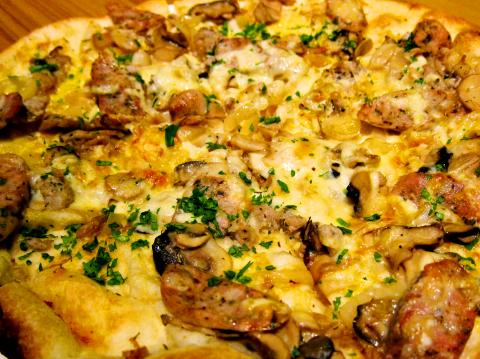Since its first branch opened in Beverly Hills in 1985, California Pizza Kitchen has built its reputation on offbeat, extravagant pizza combinations like the California club pizza (first baked with smoked bacon, chicken and mozzarella and then topped with tomatoes and chilled lettuce tossed in mayonnaise (NT$380), and the pear and Gorgonzola (the two main ingredients come alongside mozzarella, caramelized onions and mixed salad, NT$420). The chain’s first Taiwan store is located in the food court of Vieshow Cinema (威秀影城) in Xinyi District. The sit-down restaurant opened earlier this month and has been racking up good business so far. On a recent Wednesday evening, we arrived around 7:30pm but had to wait half an hour for a table.
California Pizza Kitchen is also known for a rotating selection of indulgent appetizers. The current roster at the Taipei location includes calorie bombs like pork rib quesadillas (NT$320) and karaage crispy chicken (NT$210), or Japanese-style fried chicken served with a citrus-soy dipping sauce. There are a few healthier options, such as the Greek plate, or hummus and Greek salad served with pizza bread (NT$250).
We ordered smoked salmon deviled eggs (NT$300), which were served with toasted triangles of pita bread. California Pizza Kitchen’s take on the classic American finger food featured yolk mixed with dill paste and stuffed back into hard-boiled egg white halves, topped with smoked salmon, cucumber, tomato and parsley. It tasted much lighter than traditional deviled eggs, which are usually made with dollops of mayo. Despite the slice of salty smoked salmon layered on top of each egg, however, the dish was somewhat bland and could have done with a heavy sprinkling of paprika.

Photo: Catherine Shu, Taipei Times
My companion ordered the Milan pizza (NT$420), which is smothered in three types of cheeses (Edam, mozzarella and Parmesan) and topped with spicy and sweet Italian sausage, sauteed mushrooms, caramelized onion and fresh herbs. The meat was delicious, but we were surprised by the sweetness of the crust. The pizza’s many toppings disguised its flaky, buttery texture until we got to the edge of each slice. Once we noticed it, however, it became distracting.
My serving of California kung pao spaghetti (NT320) was much more successful. Tossed in red chili paste with plenty of garlic, peanuts and crispy scallions, the pasta was very piquant. Toppings of chicken or shrimp are available for an extra charge.
With its pastry-dough-like taste, California Pizza Kitchen’s crust pairs well with sweet toppings — and, indeed, there are several dessert pizzas available, including the pearl tapioca milk tea pizza (NT$280). Topped with pearl tapioca, large multi-colored mochi (or glutinous rice) balls and lashings of tea-flavored cream, the dessert pizza looked unappetizing but tasted surprisingly good. Strawberry slices added an unexpected pop of tartness and the crispy dough was a good textural complement to all the chewy toppings. The pearl tapioca milk tea pizza is best shared between at least two people. Other sweet options include the red wine apple cinnamon pizza (NT$250) and the banana chocolate and marshmallow pizza (NT$250), which appeared to be a popular choice among other diners.

April 28 to May 4 During the Japanese colonial era, a city’s “first” high school typically served Japanese students, while Taiwanese attended the “second” high school. Only in Taichung was this reversed. That’s because when Taichung First High School opened its doors on May 1, 1915 to serve Taiwanese students who were previously barred from secondary education, it was the only high school in town. Former principal Hideo Azukisawa threatened to quit when the government in 1922 attempted to transfer the “first” designation to a new local high school for Japanese students, leading to this unusual situation. Prior to the Taichung First

Chinese Nationalist Party (KMT) Chairman Eric Chu (朱立倫) hatched a bold plan to charge forward and seize the initiative when he held a protest in front of the Taipei City Prosecutors’ Office. Though risky, because illegal, its success would help tackle at least six problems facing both himself and the KMT. What he did not see coming was Taipei Mayor Chiang Wan-an (將萬安) tripping him up out of the gate. In spite of Chu being the most consequential and successful KMT chairman since the early 2010s — arguably saving the party from financial ruin and restoring its electoral viability —

The Ministry of Education last month proposed a nationwide ban on mobile devices in schools, aiming to curb concerns over student phone addiction. Under the revised regulation, which will take effect in August, teachers and schools will be required to collect mobile devices — including phones, laptops and wearables devices — for safekeeping during school hours, unless they are being used for educational purposes. For Chang Fong-ching (張鳳琴), the ban will have a positive impact. “It’s a good move,” says the professor in the department of

Article 2 of the Additional Articles of the Constitution of the Republic of China (中華民國憲法增修條文) stipulates that upon a vote of no confidence in the premier, the president can dissolve the legislature within 10 days. If the legislature is dissolved, a new legislative election must be held within 60 days, and the legislators’ terms will then be reckoned from that election. Two weeks ago Taipei Mayor Chiang Wan-an (蔣萬安) of the Chinese Nationalist Party (KMT) proposed that the legislature hold a vote of no confidence in the premier and dare the president to dissolve the legislature. The legislature is currently controlled